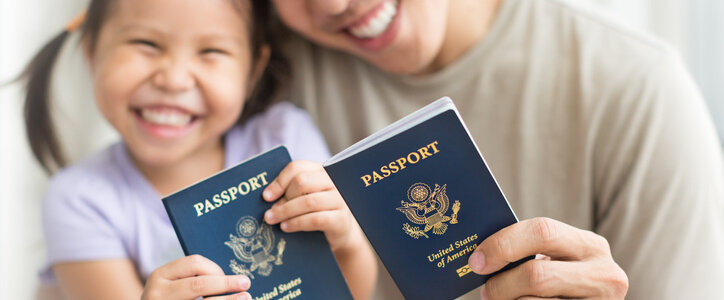LaFountain & Wollman, P.C. works with families throughout Massachusetts seeking to bring family members to the United States. We believe that families belong together but know that the number of family-based immigration visas issued each year is limited.
Our immigration attorneys are not only skilled but compassionate people who understand the burden of family separations. You can depend on us to guide you through the family-based immigration process and help your loved one gain admission to the U.S. Contact our office today for a consultation.
Understanding Family-Based Immigration in Massachusetts
Family-based immigration in Massachusetts centers around a key relationship between the “petitioner,” who sponsors a family member, and the “beneficiary,” the family member seeking an immigrant visa or permanent resident status. For a petitioner to be eligible, they must meet specific criteria:
- Be at least 21 years old.
- Hold U.S. citizenship or be a lawful permanent resident.
This process encompasses two primary categories of family-based visas:
- Immediate relative visas: These are for immediate family members of U.S. citizens, including spouses, parents, and unmarried children under 21 years of age, as well as orphans adopted abroad or in the U.S.
- Family preference visas: These visas cater to other family members.
Importantly, obtaining permanent resident status through this process grants the beneficiary the right to live and work in the U.S. indefinitely.
Immediate and Family Preference Immigrant Visas in Detail
Immediate relative (IR) visas cater to close family members of U.S. citizens. These visas are categorized as follows:
- IR1 – for spouses of U.S. citizens.
- IR2– for unmarried children under 21 years of age of U.S. citizens.
- IR3– for orphans adopted abroad by U.S. citizens.
- IR4 – for orphans to be adopted in the U.S. by a citizen.
- IR5 – for parents of U.S. citizens who are at least 21 years old.
A significant advantage of immediate relative visas is the absence of annual limits, meaning there’s no cap on the number issued each year. Additionally, applicants don’t have to wait for a visa number to become available.
If an individual doesn’t qualify for an immediate relative visa, they may be eligible for a family preference (FP) visa, designed for more distant relatives of U.S. citizens and permanent residents. These include:
- Family first preference (F1) – Unmarried, adult children aged 21 or over of U.S. citizens.
- Family second preference (F2) – Spouses and unmarried children under 21 of permanent residents.
- F2B visas – Unmarried adult children of permanent residents.
- Family third preference (F3) – Married children of U.S. citizens, along with their spouses and minor children.
- Family fourth preference (F4) – Siblings of adult U.S. citizens aged 21 and older, including their spouses and children.
It’s important to note that family members like grandparents, grandchildren, nephews, nieces, uncles, aunts, cousins, and in-laws are not eligible under the Family Preference visa categories.
The Procedure for Family-Based Immigration Applications
The family-based immigration process begins with filing Form I-130, Petition for an Alien Relative, through the U.S. Citizenship and Immigration Services (USCIS). As a sponsor, it’s your responsibility to establish a qualifying relationship with the relative you’re sponsoring, which is essential for their eligibility to enter the United States. This relationship must be verifiable and meet the criteria set by USCIS.
Essential Documentation for the Beneficiary
The beneficiary, or the family member being sponsored, must gather and submit several crucial documents, including:
- A passport valid for at least six months beyond the proposed entry date.
- An affidavit of support from the sponsor, using Form I-864.
- An application for alien registration.
- Two identification photographs.
- Other necessary civil documents, such as birth or marriage certificates, with translations where applicable.
- Completed medical examination forms.
Importantly, merely filing or obtaining approval for the I-130 petition does not automatically confer immigration status. Once the petition is approved, the next step for the beneficiary is to apply for lawful permanent residency through a U.S. embassy or consulate. This additional step is vital in the process of securing a green card.
Comprehensive Legal Assistance for Family-Based Visas
At LaFountain & Wollman, our role extends beyond just filling out forms. We provide a full range of services to facilitate your family-based visa application, including:
- Assisting in the accurate completion of the petition and affidavit.
- Collaborating with your family members to compile all necessary documents.
- Representing and advocating for you before the U.S. Citizenship and Immigration Services (USCIS).
Our firm’s extensive experience and established relationships with immigration officials are
instrumental in streamlining the application process. We aim to avoid common pitfalls associated with family-based immigration visas, ensuring a smoother journey for you and your family.
Dedicated to Reuniting Families
At LaFountain & Wollman, we understand the emotional significance of reuniting families. Our approach combines in-depth knowledge with compassion and dedicated support. You can rely on our team to do everything in our power to facilitate the reunion of your family in the U.S., providing peace of mind and guiding you through each step of this important journey.
